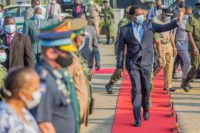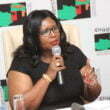Many judges of have characterised President Edgar Lungu’s State of the National Address (SONA, themed ‘Accelerating Sustainable Development for a Better Zambia Amidst the Impact of Climate Change’) on 13th September 2019 as uninspiring and a missed opportunity to address the key development challenges facing the country such as perception of corruption, high cost of living, public debt, deteriorating economy, including energy deficits. I agree. But there is something Edgar Lungu got right, and that is the argument on climate change. However, the prospects for climate resilient nation that “can re-align itself to new ways of sustainability by understanding the changing environment” (SONA 2019) are limited currently. Policy developments in water-food-energy reveal tensions and contestations and require attention from government. Reckless issuance of water rights such as in central province and destruction of green spaces such as Forest Number 27 for private accumulation takes away the centrality of President Edgar Lungu’s speech.
In his own words:
“As I fly within the country, I see the drought-stricken areas on one side and the flooded areas on the other. I have seen how climate change can create varying conditions with negative effects within one country”
Most climate models project decreases in annual precipitation for southern Africa – in the region of 20% by the 2080s. High levels of hydro meteorological variability are projected to be in regions with high population concentration and will double by 2050. Linked to impact models, these changes would reduce water availability which would affect crop yields. In predominantly agrarian regions such as Africa, this would greatly compromise livelihoods patterns. And it gets worse. Recent reports have shown that in southern Africa, physical and socio-economic exposure to climate is high in many areas and in crucial economic sectors. Physical and socio-economic exposure to climate is high in socio-economically vulnerable areas and crucial sectors, such as agriculture, but also in energy generation and mining. In countries such as DRC, Malawi, Lesotho and Zambia, 100% of electricity production is from hydropower. Extensive sharing mechanism as part of the Southern African Power Pool (SAPP) means hydropower is central to regional energy security. Thus, “[s]patial interdependence is also high, driven, for example, by the regional extent of many climate anomalies and river basins and aquifers that span national boundaries.” Climate change can heighten the politics around resource management if not conflicts. Edgar Lungu’s speech provides a framework for Zambia to think critically about the association between national rainfall, Gross Domestic Product and crop production which remains weak in policy development.
Links between climate and economic activity in the region are complex and difficult to establish,
“economic modelling studies in Malawi and Zambia indicate that the severe 1992 drought caused a drop in GDP of approximately 7–9% and adversely affected household poverty.” Climate change will potentially offset economic gains made thus far. In the speech, climate variability was blamed for slowing the Zambian economy, noting since 2015, when we experienced droughts that affected electricity generation, growth slowed down to an average of 3.5% (2015 – 2018) from average 6.4% earlier (2011 – 2014). To Edgar Lungu, “climate change is the current world challenge, greatly hindering the development of many nations.” It is difficult to disagree with him.
The problem facing Edgar Lungu’s speech is that currently, discussions about climate change crisis are too compartmentalised, too siloed from the other development crises the country. In the context of agriculture for instance, our research in Zambia (DOI: 10.1111/geoj.12291) has shown while possibilities for irrigation expansion are created by state institutions, the state agencies seeking to administer water resources also limit their potential through competing authority and agendas. Developments in central province show agriculture production and issuance of water rights has failed to address energy concerns both raising serious implications for sustainable water resource management. More widely, natural resource scarcity – water–energy–food interdependencies framed as a nexus, or resource trilemma – have insufficiently been integrated in policy in such a way as to recognise the complex interactions between sectors and resource systems. How to minimise the trade-offs and risks of adverse cross- sectoral impacts remains less explored in national policy developments. If the water-energy-food crises are intersecting and interconnecting, then it follows that their related solutions should also be intersecting and interconnecting in nature. This points to what the President alluded to the need to become more resilient in the midst of climate change.
Recognition of spatial and sectoral interdependencies should inform policies, institutions and investments for enhancing water, energy and food security. National political and economic instruments should be strengthened for this purpose. As Klein argues, “[t]here is every chance we will miss the mark, but every fraction of a degree warming that we are able to hold off is a victory and every policy that we are able to win that makes our societies more humane, the more we will weather the inevitable shocks and storms to come without slipping into barbarism.” The centrality of President Edgar Lungu’s speech should encourage us on how we can think about climate change as cross-cutting, intersecting and interconnected. He notes, the effects of climate change could undermine our aspirations if not urgently addressed.
Prospects of job creation, tourism, food security, livestock and agriculture and energy production face a dark future in Zambia, but hope lies in changing our culture towards shared resource management. The President argued “I fully subscribe to the notion that the best way to predict the future is to create it.” Perhaps such a commitment should begin by putting a stop to the destruction of our green spaces such as Forest Number 27 which has major environmental contributions to Lusaka city. It should consider regulating the way private infrastructure developments such as shopping malls are permitted. Government should regulate issuance of water rights and water grabbing practices in environmentally delicate areas. Emphasis should be placed on rain water harvesting technologies and infrastructure development. This is a question of policy but also of culture – a feature for holistic approaches. Perhaps what the President want Zambians to learn is never take lightly actions that destroy our environment for narrow selfish gains. Government’s next actions will shed light.
(Simon Manda, PhD, Lecturer, University of Zambia 2014 Mandela Washington Fellow)












